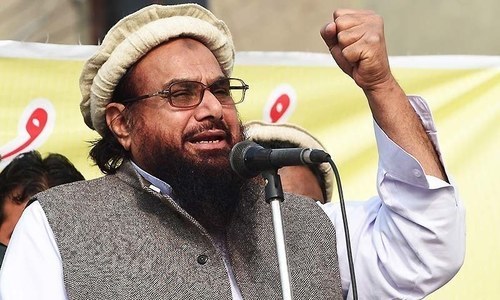India on Thursday expressed displeasure at the imminent release of Jamaatud Dawa (JuD) chief Hafiz Mohammad Saeed, who it accuses of organising the 2008 Mumbai attacks.
A day earlier, the Lahore High Court had refused to extend detention orders against Saeed, whose current house arrest is going to expire on Nov 24 (Friday).
The review board under the chair of Justice Abdul Sami Khan passed these orders after a senior finance ministry official failed to convince the board that the release of Saeed would bring diplomatic and financial problems to the country.
The JuD chief had been placed under house arrest on January 31 for 90 days. Subsequently, his house arrest had been extended several times.
“India is outraged that a self-confessed and a UN proscribed terrorist is allowed to walk free and continue with his agenda,” Raveesh Kumar, India's foreign ministry spokesman, told reporters at a weekly briefing in New Delhi.
Kumar said Saeed's release will give an impression that Pakistan supports non-state actors.
Saeed was declared a global terrorist by the US and the United Nations over his alleged role in the attacks that left nearly 166 people dead, including Western nationals.
JuD is considered by the US and India to be a front for Lashkar-e-Taiba (LeT), the militant group blamed for the attacks.
The United States identifies Lashkar-e-Taiba as one of the largest and most active terrorist organisations in South Asia. Founded in 1987 by Hafiz Saeed, Abdullah Azzam and Zafar Iqbal in Afghanistan, the group was headquartered in Muridke before it was disbanded and re-organised.
Following the LHC's decision to cut his detention short, Saeed had told media that the decision was tantamount to "the victory of truth" and called it "a serious blow" to India's demands.
Pakistan pursuing policy of peace
Foreign Secretary Tehmina Janjua said Pakistan was pursuing a policy of peace with neighbours and firmly believes that political engagements with the rest of the world should continue to achieve the objectives of the foreign policy.
Janjua claimed that India continues to thwart Pakistan's "sincere" efforts to initiate dialogue between the two countries. She insisted that Pakistan pursued a policy that would bring peace in the region.
Despite Pakistan's efforts, India does not seem to be in the "mood for dialogue", Janjua said.


































